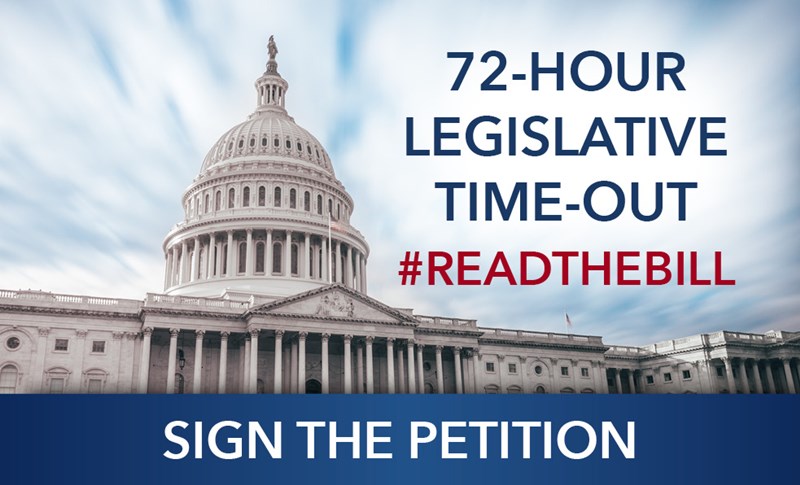



Congress routinely passes massive spending bills nicknamed “stimulus,” “omnibus,” “relief,” or “COVID.” But whatever Congress calls these bills, one thing is the same: no one has time to read them.
If elected Members of Congress, the press, and the people, don’t have time to read the legislation, do we really have a representative republic?
This week, our organization at OpenTheBooks.com kicked off a petition campaign to simply “read the bill.” The campaign revives the national effort to require a 72-hour timeout before the final vote while the legislation is posted online for all to review.
In the year 2021, when thousands of pages can be uploaded in seconds and published online at virtually no cost, why are bills still only rolled out mere hours or minutes before passing Congress?
When asked for a paper copy of the 5,593-page, $1.4 trillion, COVID-19 relief bill, released just hours before a roll call vote was taken in December, House Rules Committee Chairman James McGovern (D-MA) reportedly said, “I think if we provide everyone a paper copy we would have to destroy an entire forest.”
Does that response pass muster? Not according to Rep. Alexandria Ocasio-Cortez (D-NY), who tweeted out her frustration:
“This is why Congress needs time to actually read this package before voting on it. Members of Congress have not read this bill. It’s over 5000 pages, arrived at 2pm today, and we are told to expect a vote on it in 2 hours.
This isn’t governance. It’s hostage-taking. And by the way, it’s not just members who need to see the bill ahead of time - YOU do. The PUBLIC needs to see these bills with enough time to contact their rep to let them know how they feel. …”
That compelling argument was echoed by the Associated Press: “The $900 billion pandemic relief package that was rushed through Congress created a familiar year-end conundrum for lawmakers: It was a bill too big to fail, and also too big to read.”
A bipartisan fix is long overdue.
This is why the powerful Appropriations Clause of Article I, Section 9 of the Constitution demands transparency. In the Internet age, there is a clear interpretation: every piece of legislation online, in real time.

For years, reformers have tried to change the rules governing the House and the Senate to require legislative text to be made available to the general public. Occasionally, they succeeded in changing the rules, only to have them “waived” when that too-big-to-fail (and read) bill came to the floor.
The late Rep. John Dingell (D-MI) once famously told a House Judiciary subcommittee, “I’ll let you write the substance …You let me write the procedure, and I’ll screw you every time.”
Recognizing that reality, there are some folks in Congress ready for reform. U.S. Senator Rick Scott (R-FL) plans to champion the issue in this Congress. Another senator expressing interest in legislative transparency is Joni Ernst (R-IA).
U.S. Senator Rand Paul (R-KY) has raised awareness on this issue for years and introduced legislation to fix it. Sen. Paul responded to our comment request:
"Too often in Congress, legislation is shoved through without hearings, amendments or debate. If we are to answer to the American people, it is imperative we pay close attention to the legislation we pass."
Seventy-two hours to read the bill is a modest start, considering the fact that the December COVID relief bill would have taken 93 hours to read if reading a page per minute [5,593 pages /60 min=93 hours].
The 72-hour rule may still require speed-readers in some cases, but it will go a long way towards empowering legislators, the press, and taxpayers.
The national discourse would benefit from serious debates on public policy.
Ask Congress to #ReadTheBill.